Special Report
These Passports Get You Into the Fewest Countries
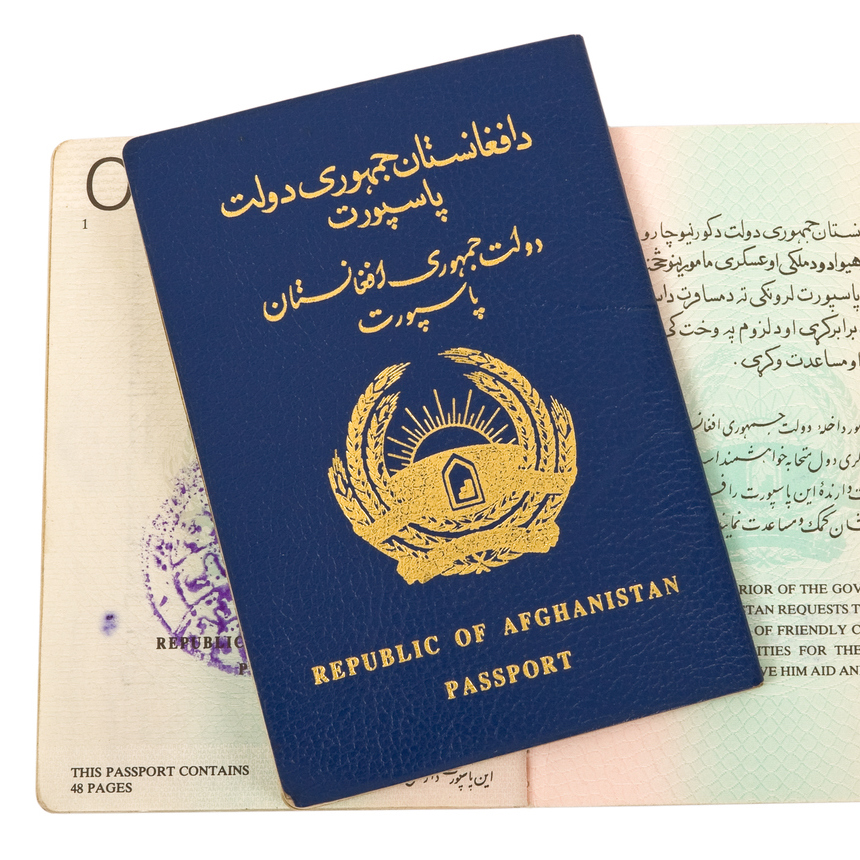
Published:
Last Updated:

Passports function as a key to the outside world, but passports from certain countries significantly limit how many places their holders can access. Citizens of many developing countries and of nations ravaged by conflict have a significantly harder time crossing borders than those of most other nations.
Nomad Capitalist, an organization focused on worldwide asset diversification, created the Nomad Passport Index as a way to rank countries based on the usefulness of their passports. Specifically, the index ranks countries based on how easy it is for their citizens to move freely between countries. It also considers their exposure to overseas taxes as well as the rights they are granted domestically.
A country allows entry to people based on their passport, trusting that the issuing country does a good job of ensuring its citizens will conduct in a safe and responsible manner. But citizens of countries with weak passports often require a extra levels of vetting.
Click here to see the passports that give owners the least freedom to travel
Click here to see our detailed findings and methodology
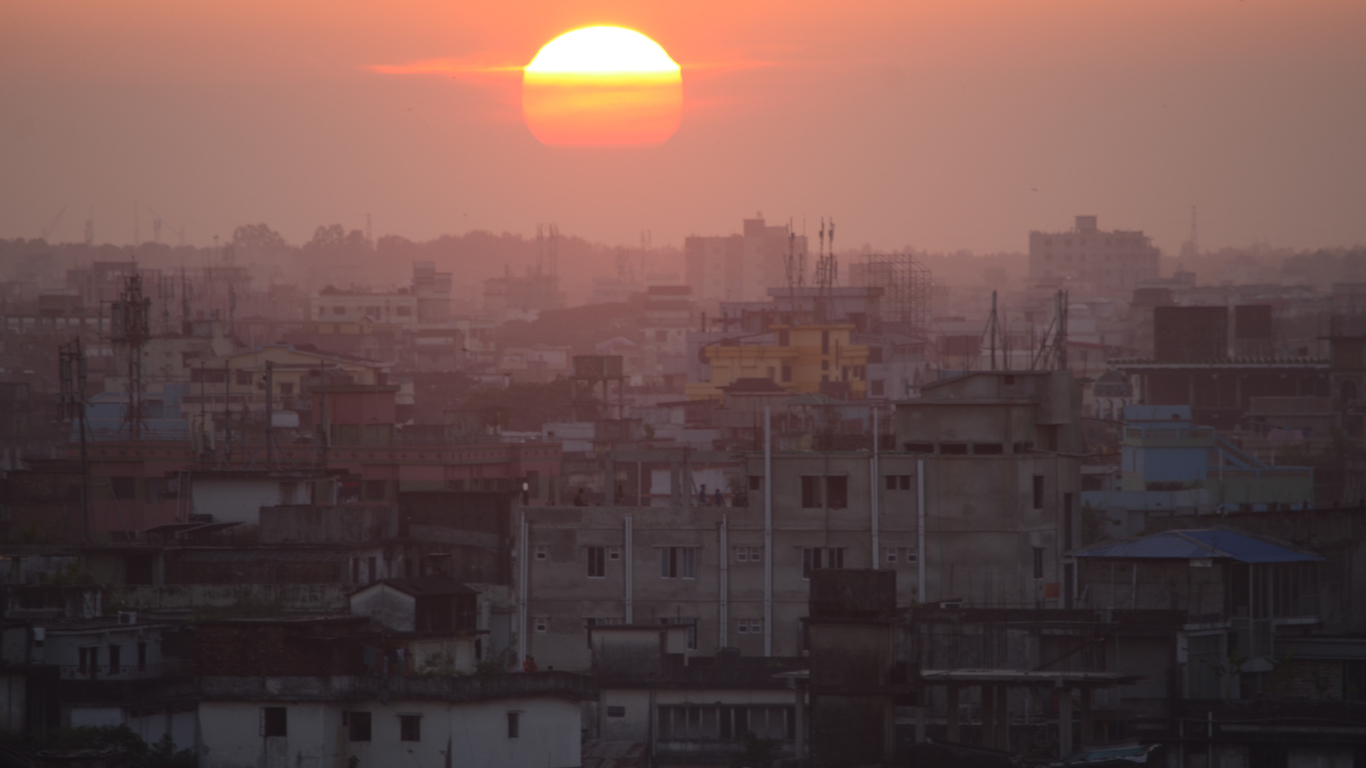
25. Bangladesh tied — 24th weakest
> Visa-free travel permitted to: 38 countries
> Dual citizenship: Allowed; some restrictions
> Type of government: Parliamentary republic
> GDP per capita: $4,207
[in-text-ad]

24. India tied — 24th weakest
> Visa-free travel permitted to: 49 countries
> Dual citizenship: Not allowed
> Type of government: Federal parliamentary republic
> GDP per capita: $7,153

23. Algeria tied — 22nd weakest
> Visa-free travel permitted to: 47 countries
> Dual citizenship: Usually not allowed
> Type of government: Presidential republic
> GDP per capita: $15,282
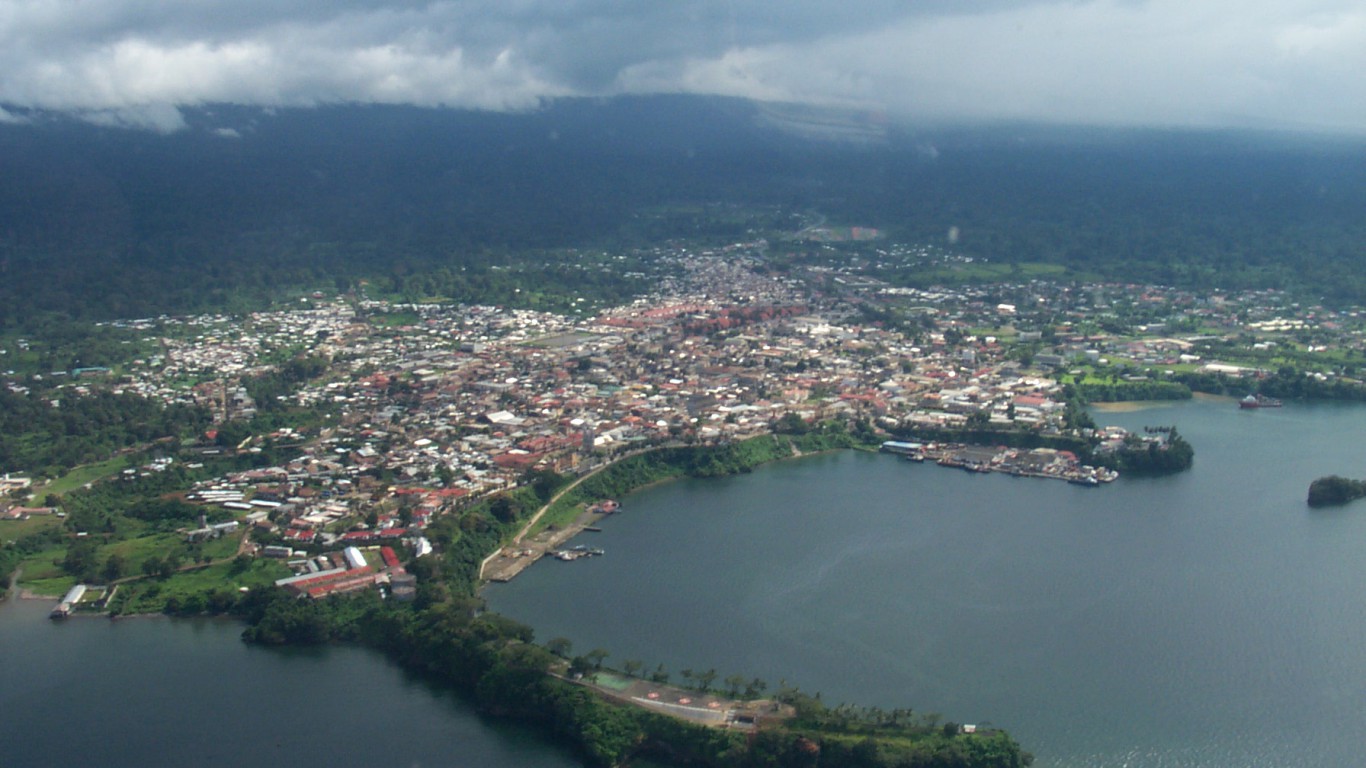
22. Equatorial Guinea tied — 22nd weakest
> Visa-free travel permitted to: 47 countries
> Dual citizenship: Usually not allowed
> Type of government: Presidential republic
> GDP per capita: $36,557
[in-text-ad-2]
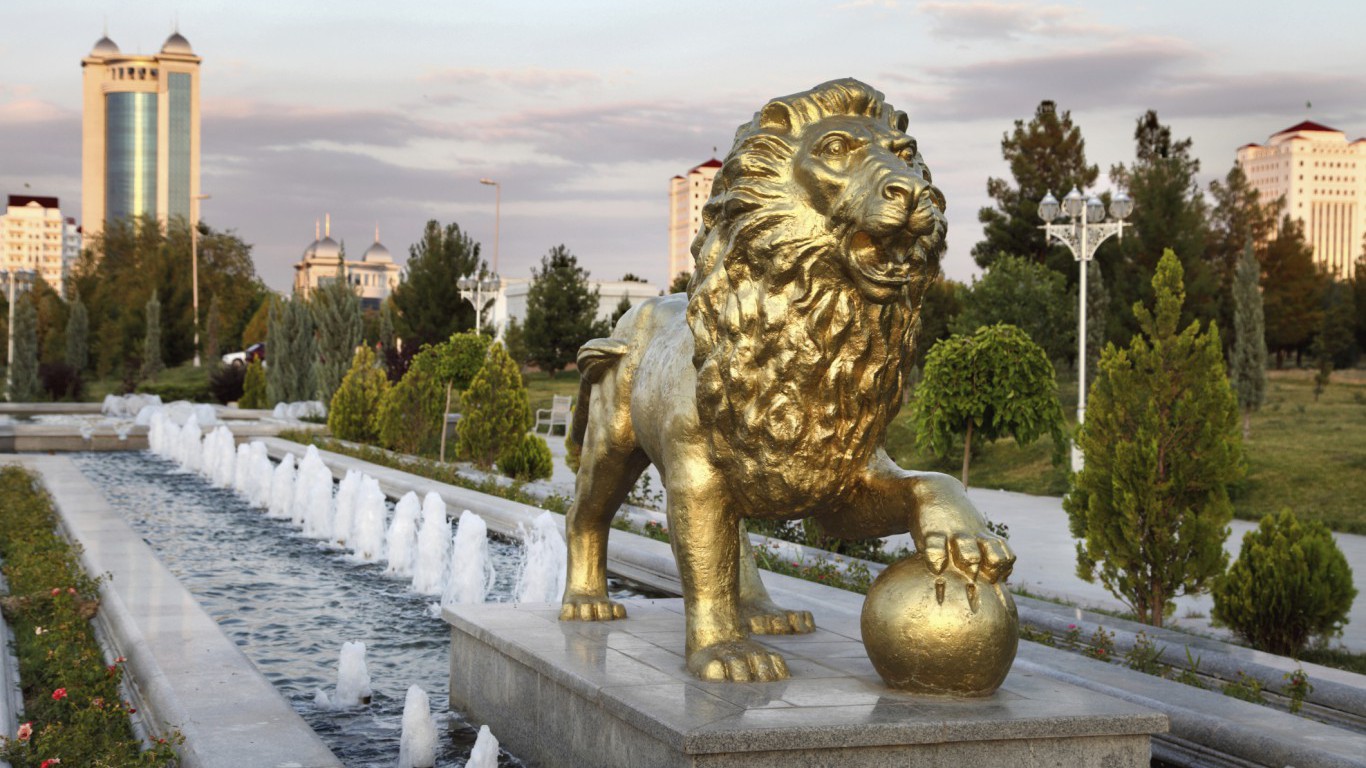
21. Turkmenistan tied — 19th weakest
> Visa-free travel permitted to: 50 countries
> Dual citizenship: Not allowed
> Type of government: Presidential republic; authoritarian
> GDP per capita: $18,771
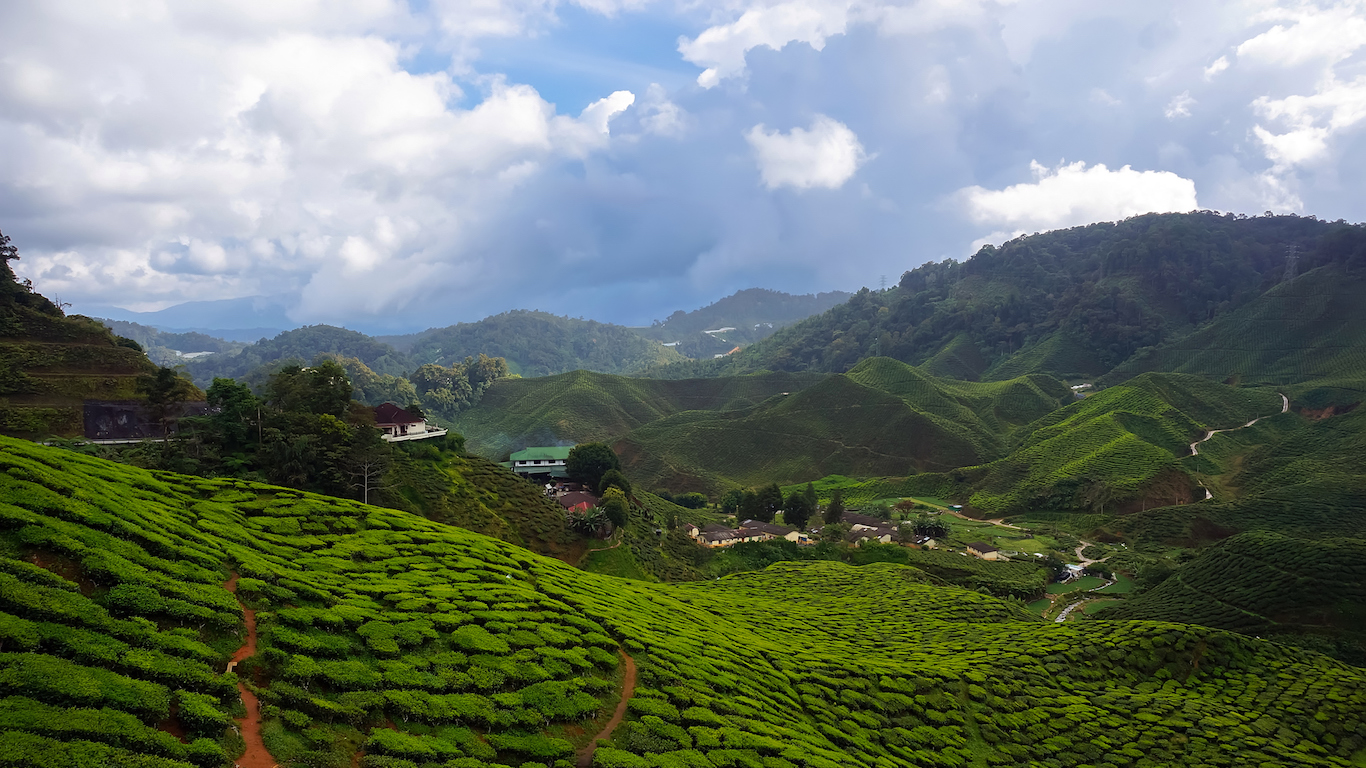
20. Cameroon tied — 19th weakest
> Visa-free travel permitted to: 46 countries
> Dual citizenship: Not allowed
> Type of government: Presidential republic
> GDP per capita: $3,358
[in-text-ad]
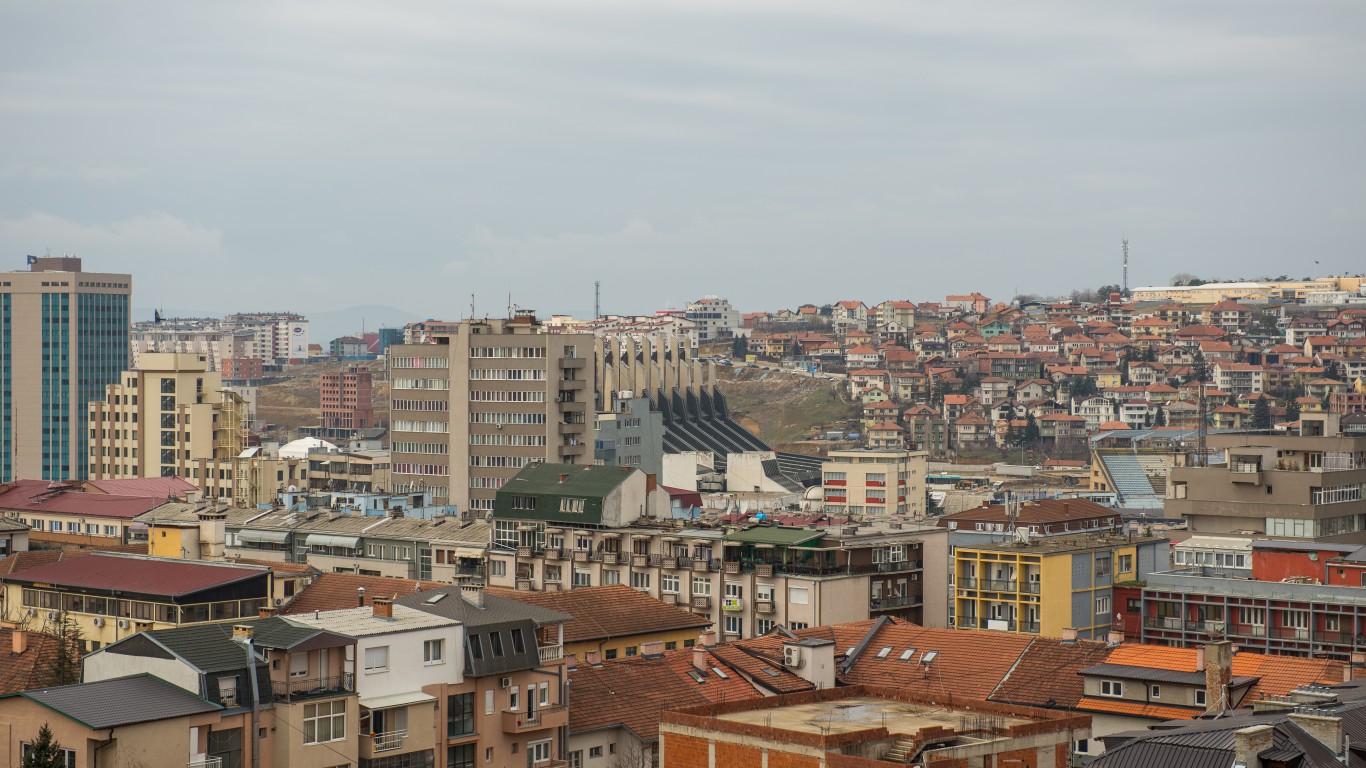
19. Kosovo tied — 19th weakest
> Visa-free travel permitted to: 38 countries
> Dual citizenship: Usually allowed
> Type of government: Presidential republic
> GDP per capita: N/A
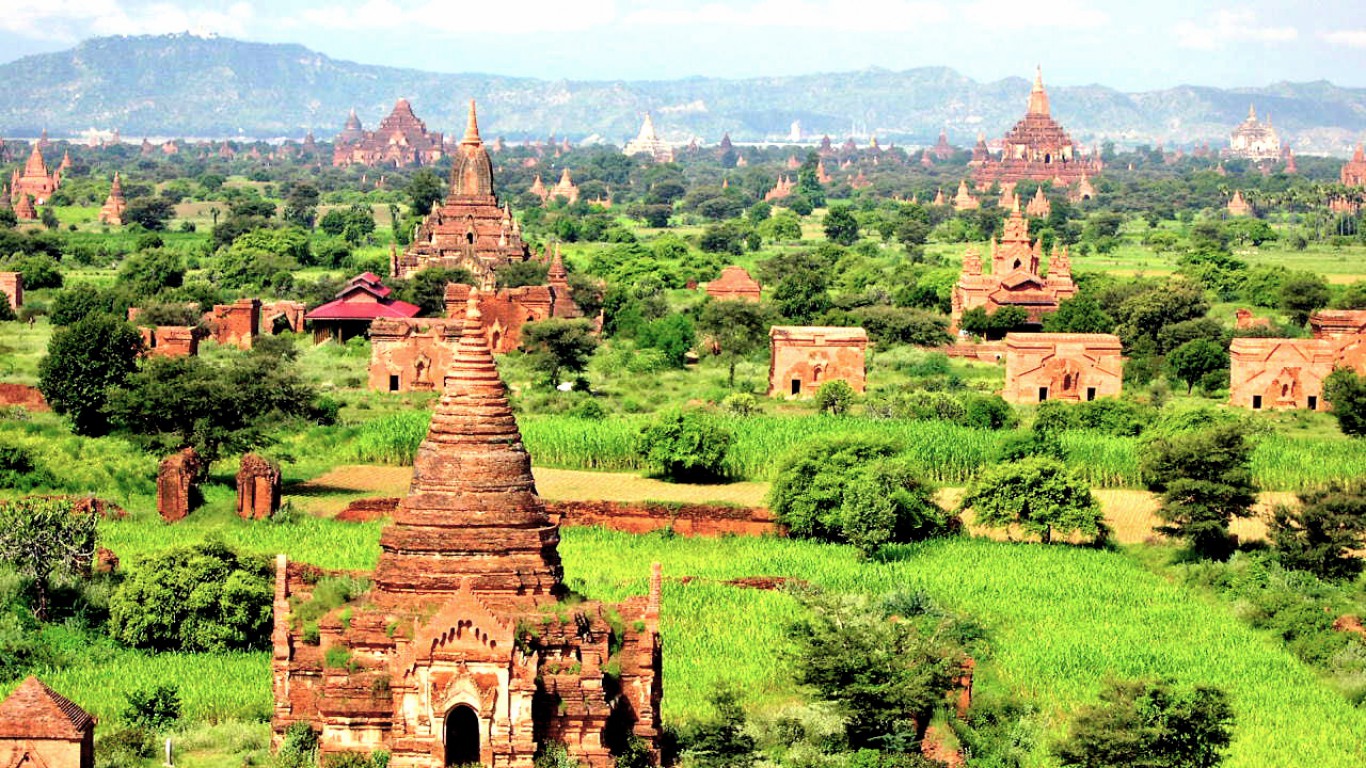
18. Myanmar — 17th weakest
> Visa-free travel permitted to: 42 countries
> Dual citizenship: Not allowed
> Type of government: Parliamentary republic
> GDP per capita: $6,361
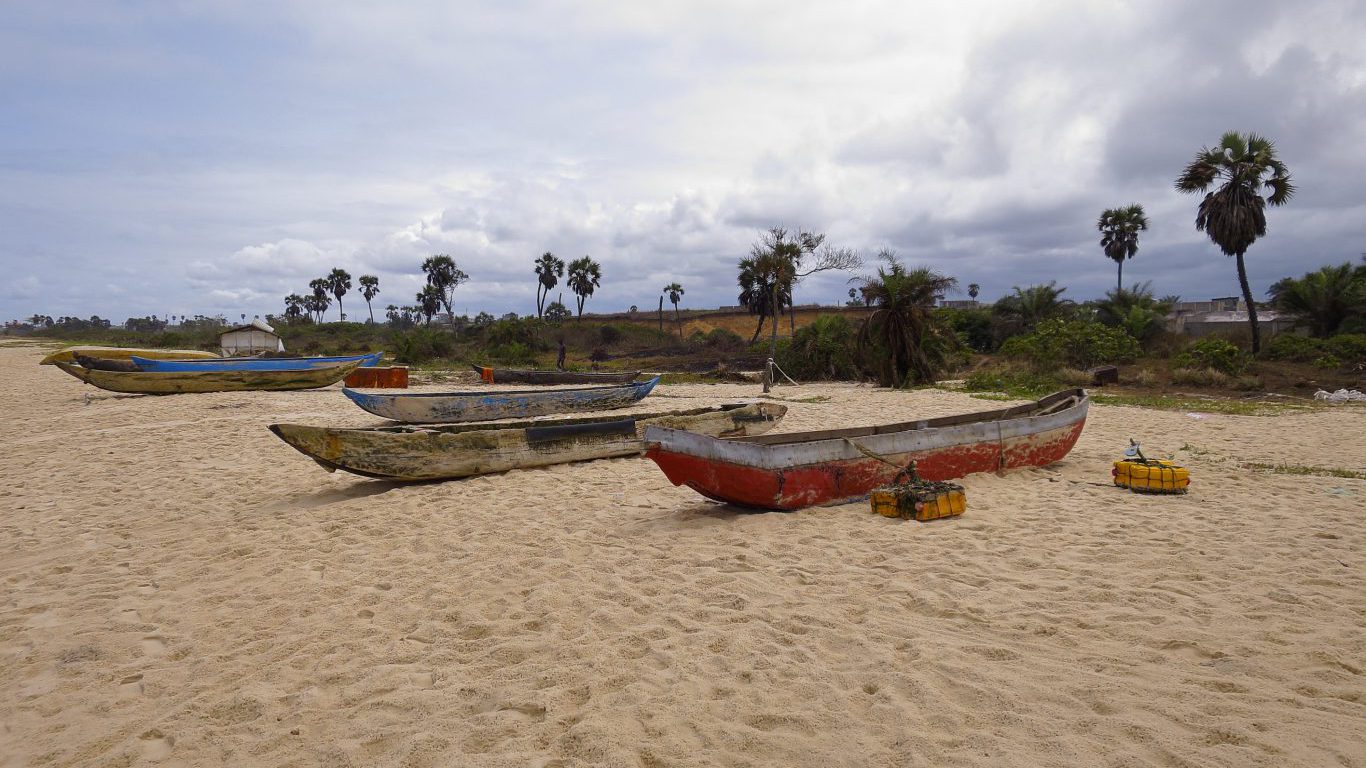
17. Republic of Congo — 17th weakest
> Visa-free travel permitted to: 46 countries
> Dual citizenship: Allowed
> Type of government: Presidential republic
> GDP per capita: $6,721
[in-text-ad-2]
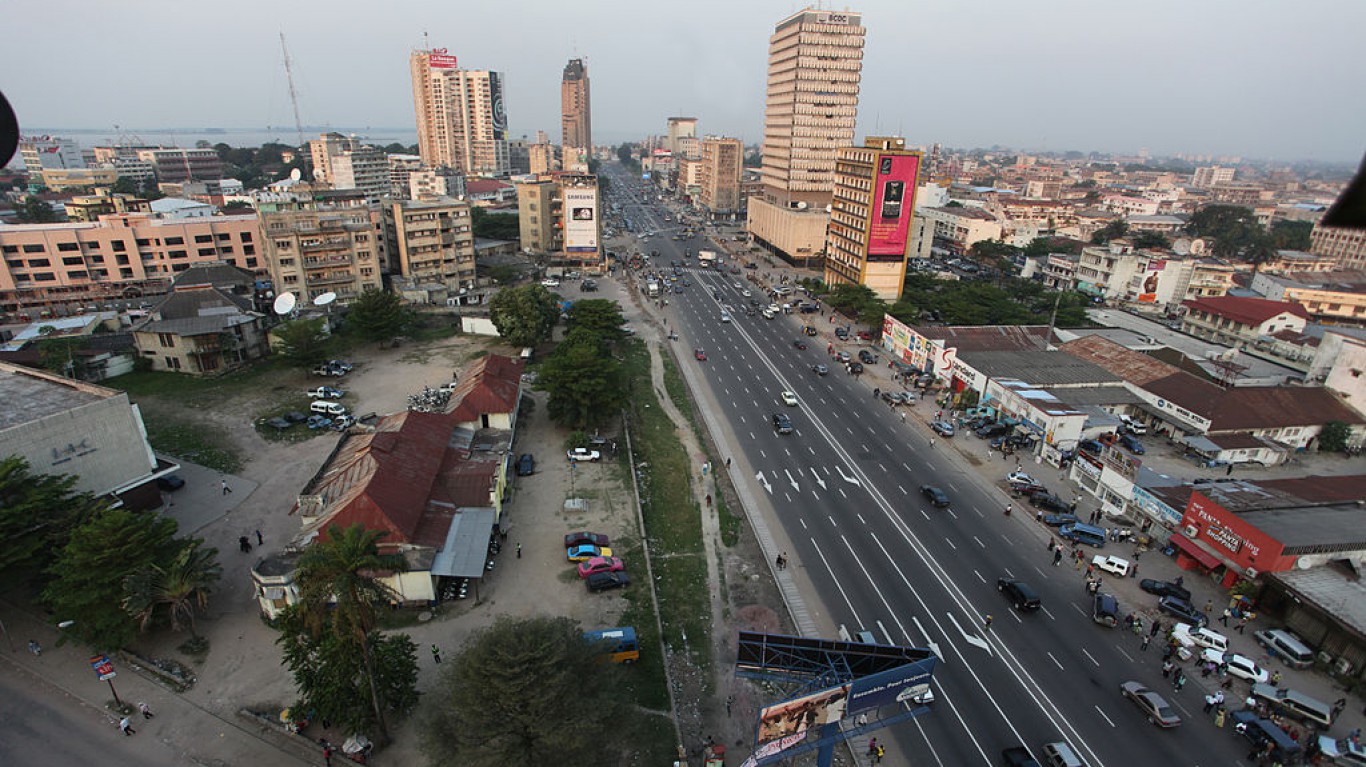
16. Democratic Republic of the Congo 16th weakest
> Visa-free travel permitted to: 43 countries
> Dual citizenship: Not allowed
> Type of government: Semi-presidential republic
> GDP per capita: $789

15. Palestinian Territory tied — 14th weakest
> Visa-free travel permitted to: 37 countries
> Dual citizenship: Usually not allowed
> Type of government: Parliamentary democracy
> GDP per capita: N/A
[in-text-ad]
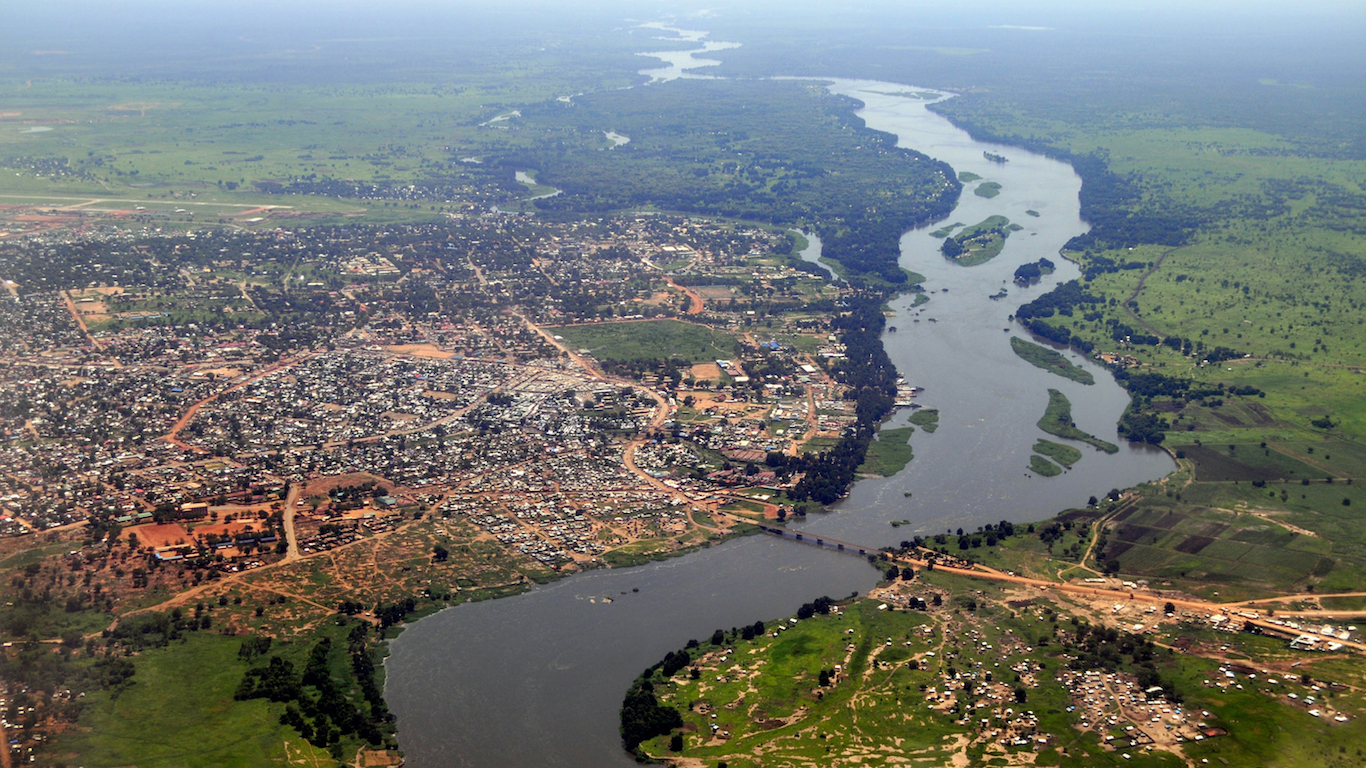
14. South Sudan tied — 14th weakest
> Visa-free travel permitted to: 39 countries
> Dual citizenship: Allowed; some restrictions
> Type of government: Presidential republic
> GDP per capita: $1,555
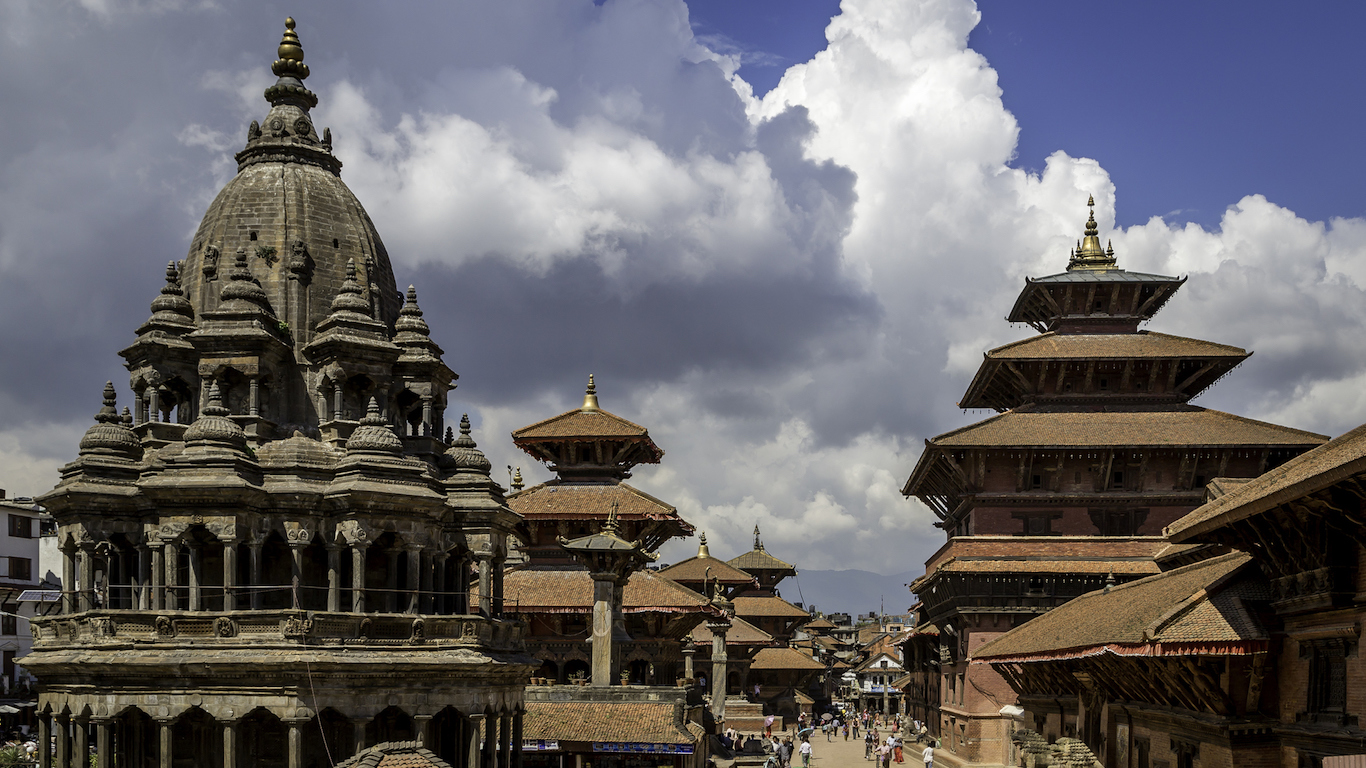
13. Nepal tied — 12th weakest
> Visa-free travel permitted to: 36 countries
> Dual citizenship: Not allowed
> Type of government: Federal parliamentary republic
> GDP per capita: $2,642
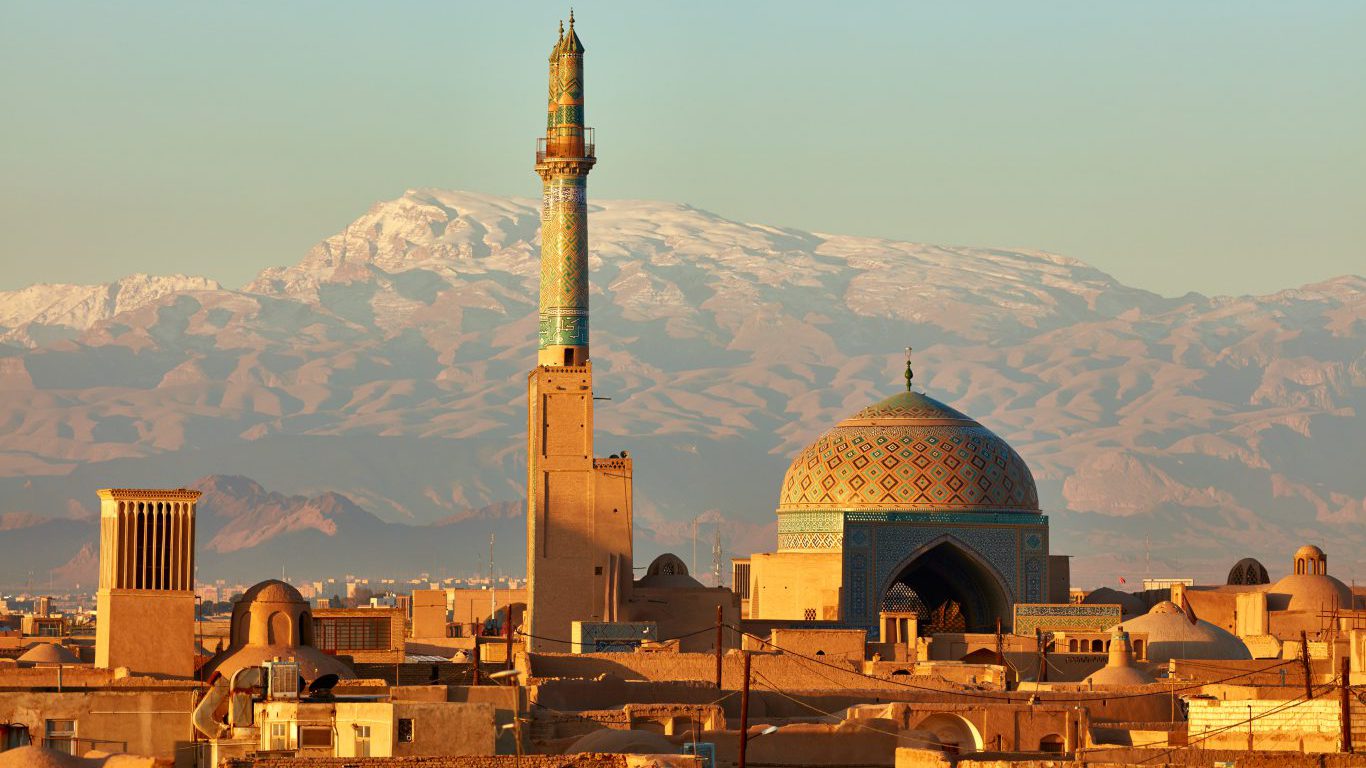
12. Iran tied — 12th weakest
> Visa-free travel permitted to: 38 countries
> Dual citizenship: Usually not allowed
> Type of government: Theocratic republic
> GDP per capita: $18,858
[in-text-ad-2]
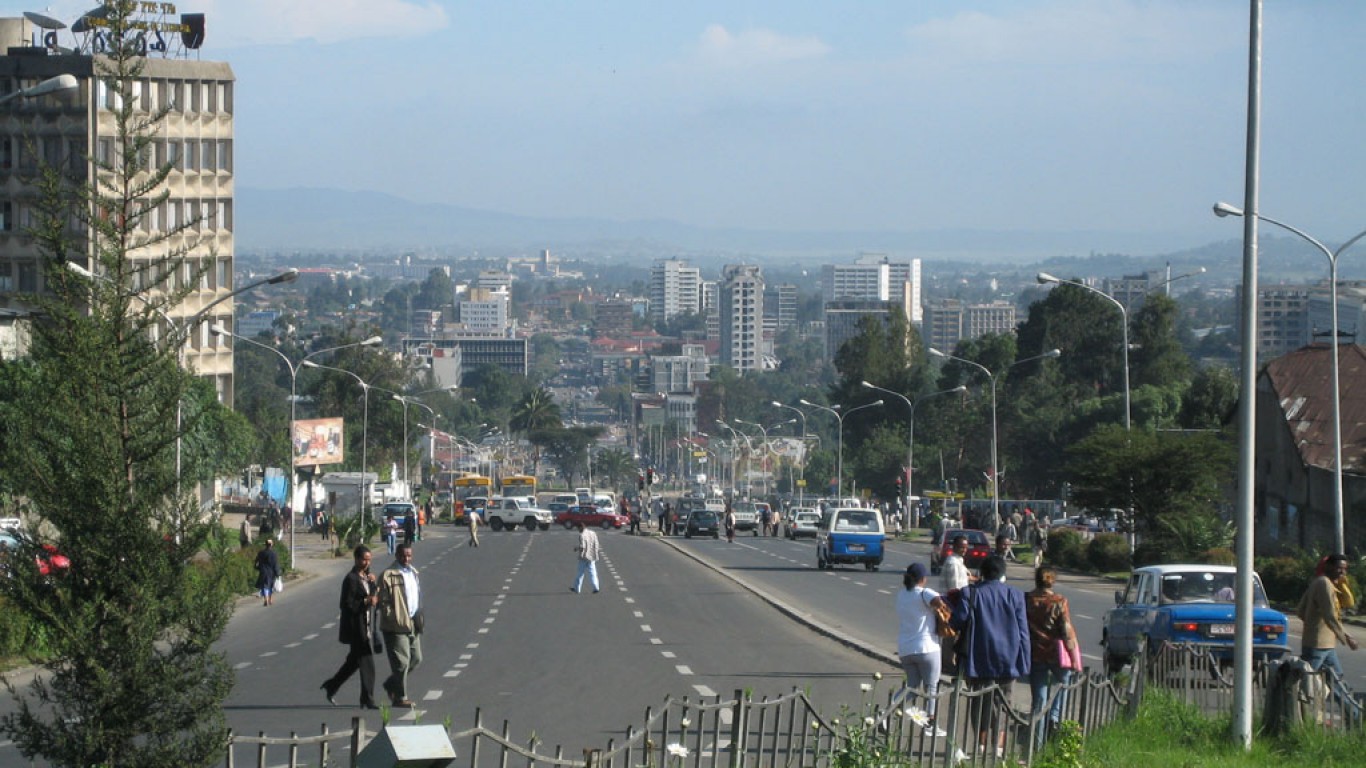
11. Ethiopia 11th weakest
> Visa-free travel permitted to: 39 countries
> Dual citizenship: Not allowed
> Type of government: Federal parliamentary republic
> GDP per capita: $2,104
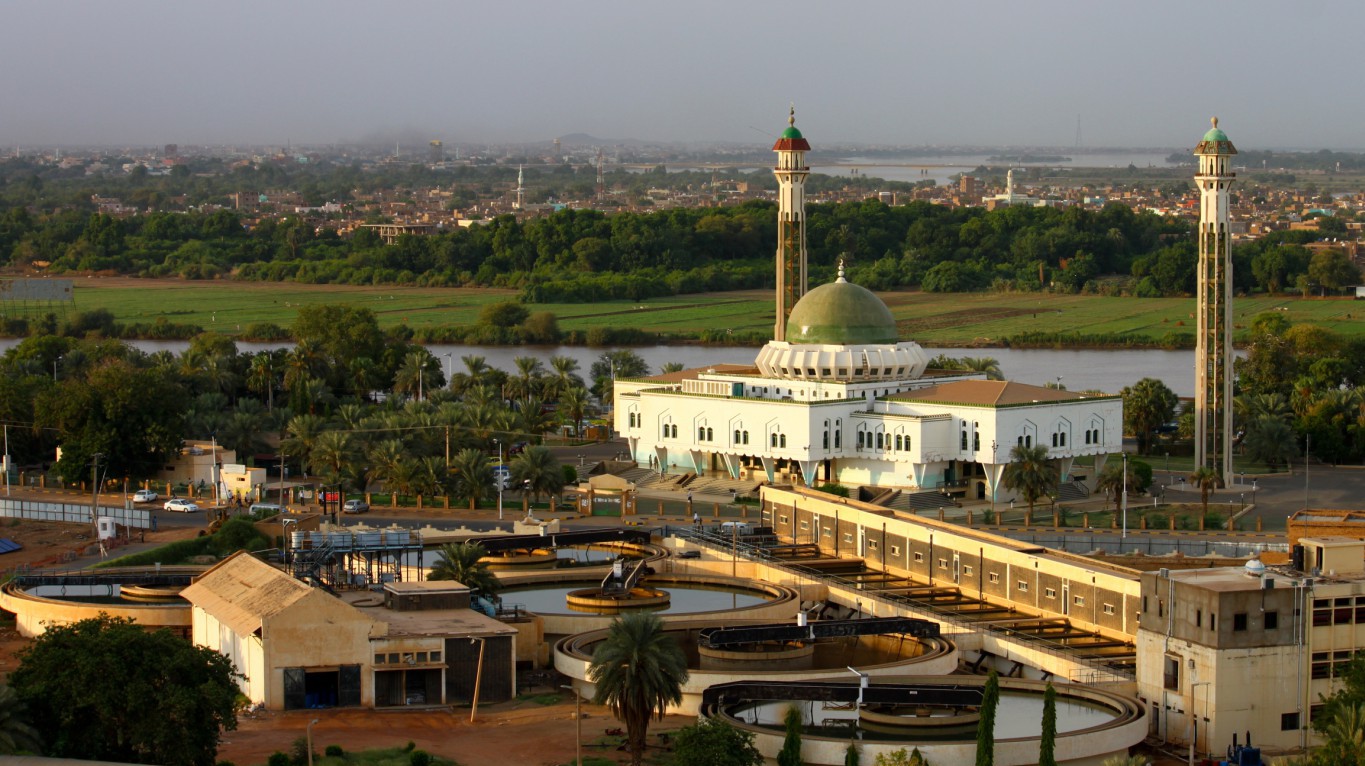
10. Sudan 10th weakest
> Visa-free travel permitted to: 40 countries
> Dual citizenship: Usually not allowed
> Type of government: Presidential republic
> GDP per capita: $4,578
[in-text-ad]
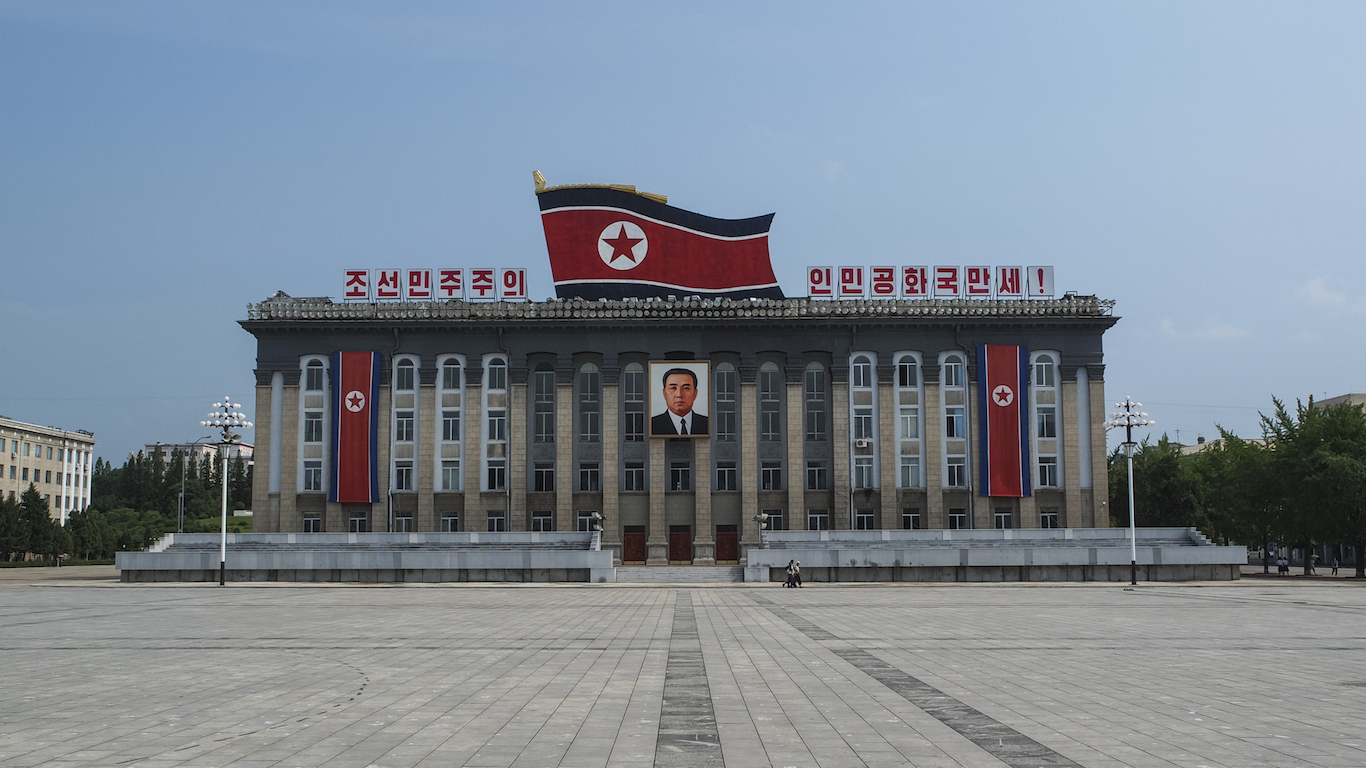
9. North Korea 9th weakest
> Visa-free travel permitted to: 39 countries
> Dual citizenship: Not allowed
> Type of government: Single-party state
> GDP per capita: N/A
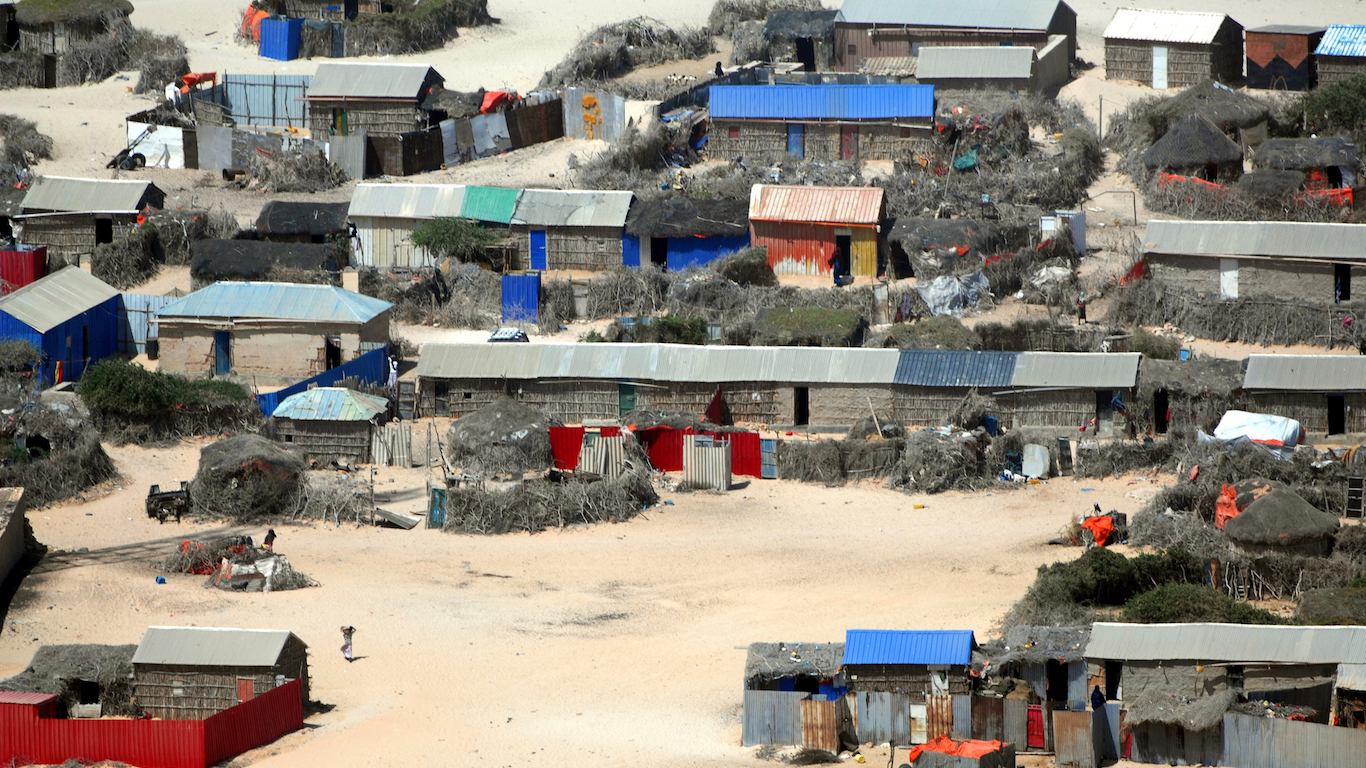
8. Somalia tied — 7th weakest
> Visa-free travel permitted to: 32 countries
> Dual citizenship: Usually not allowed
> Type of government: Federal parliamentary republic
> GDP per capita: N/A
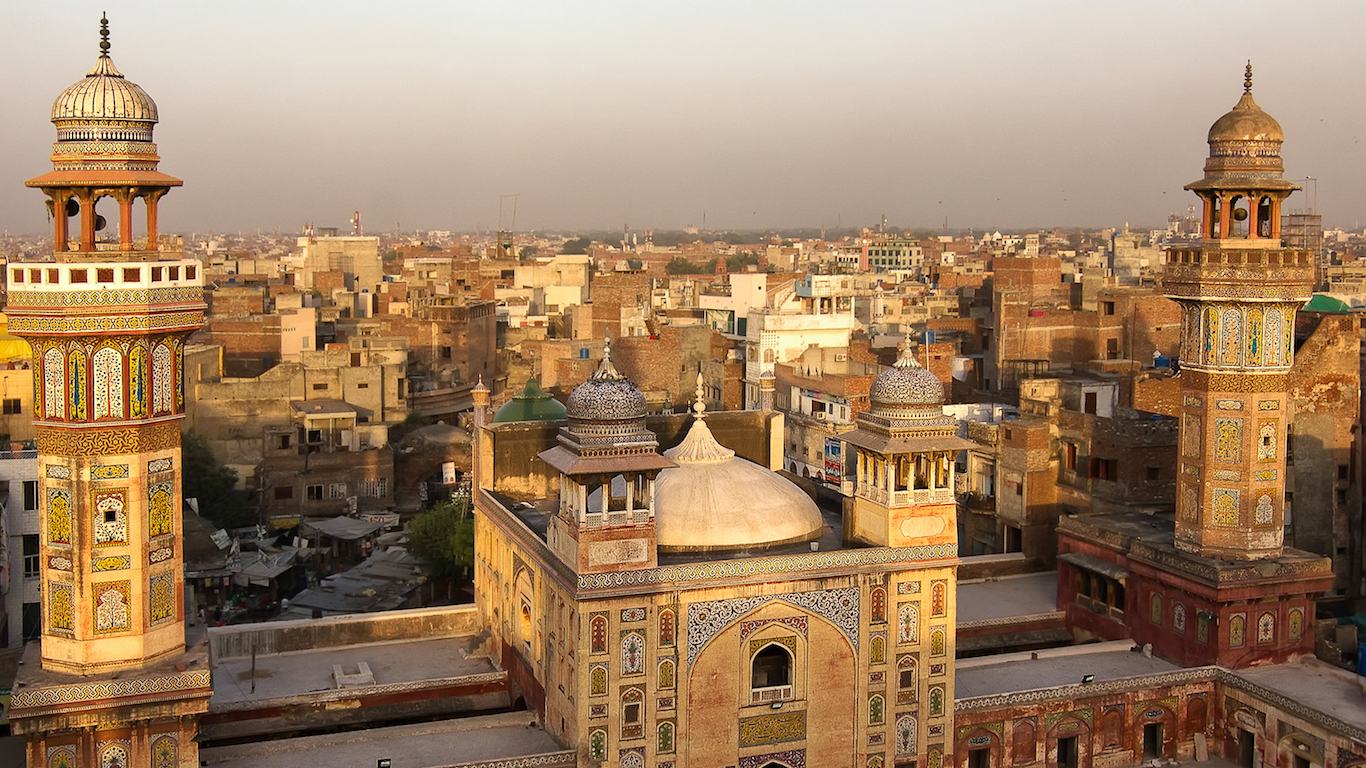
7. Pakistan tied — 7th weakest
> Visa-free travel permitted to: 30 countries
> Dual citizenship: Allowed; some restrictions
> Type of government: Federal parliamentary republic
> GDP per capita: $5,375
[in-text-ad-2]
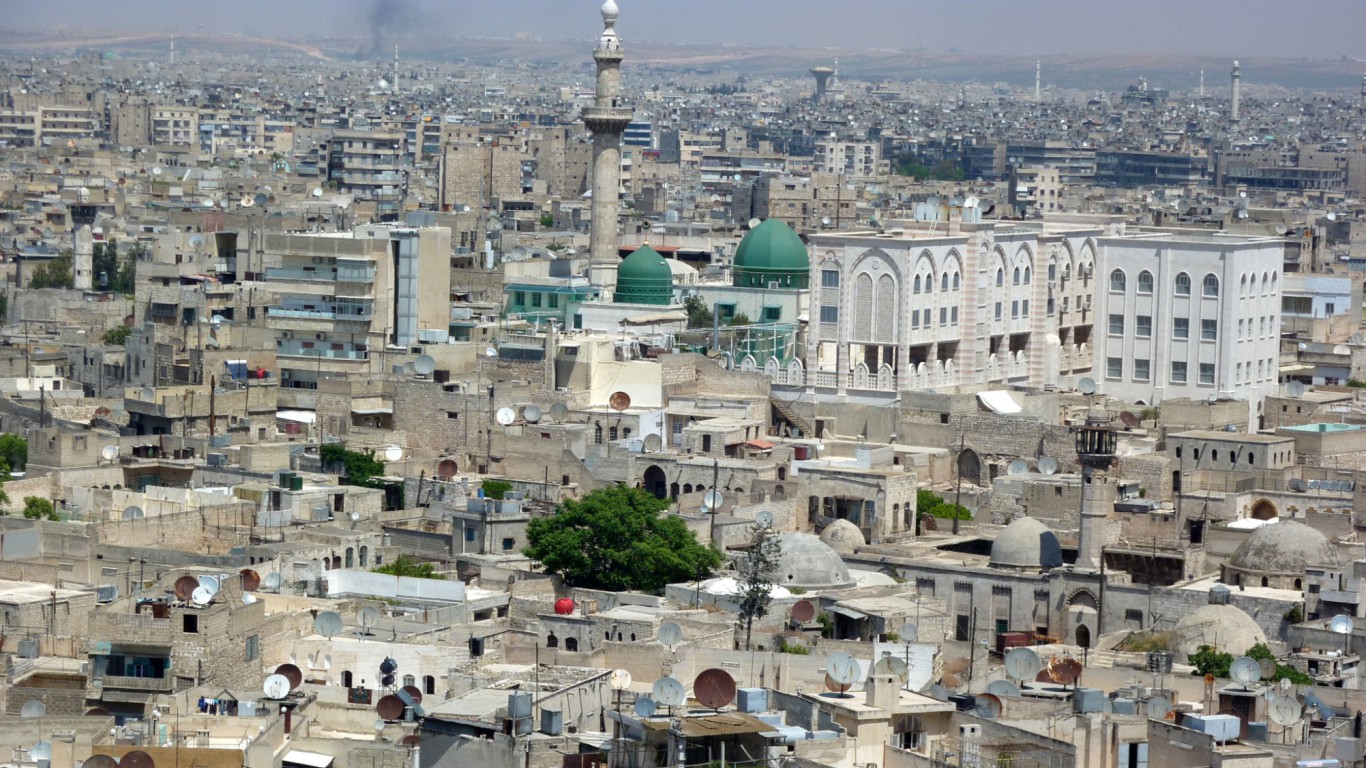
6. Syria tied — 5th weakest
> Visa-free travel permitted to: 28 countries
> Dual citizenship: Allowed; some restrictions
> Type of government: Presidential republic; highly authoritarian regime
> GDP per capita: N/A
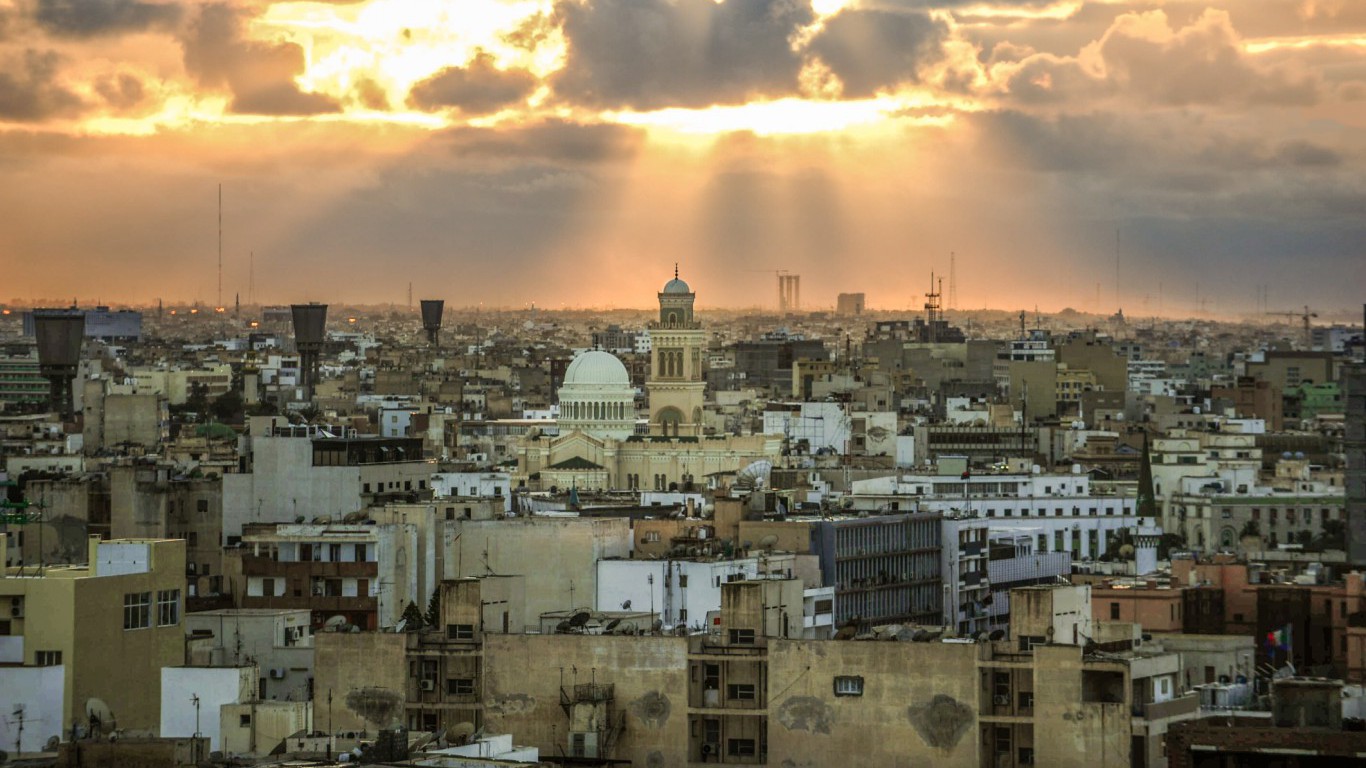
5. Libya tied — 5th weakest
> Visa-free travel permitted to: 36 countries
> Dual citizenship: Not allowed
> Type of government: In transition
> GDP per capita: $13,502
[in-text-ad]
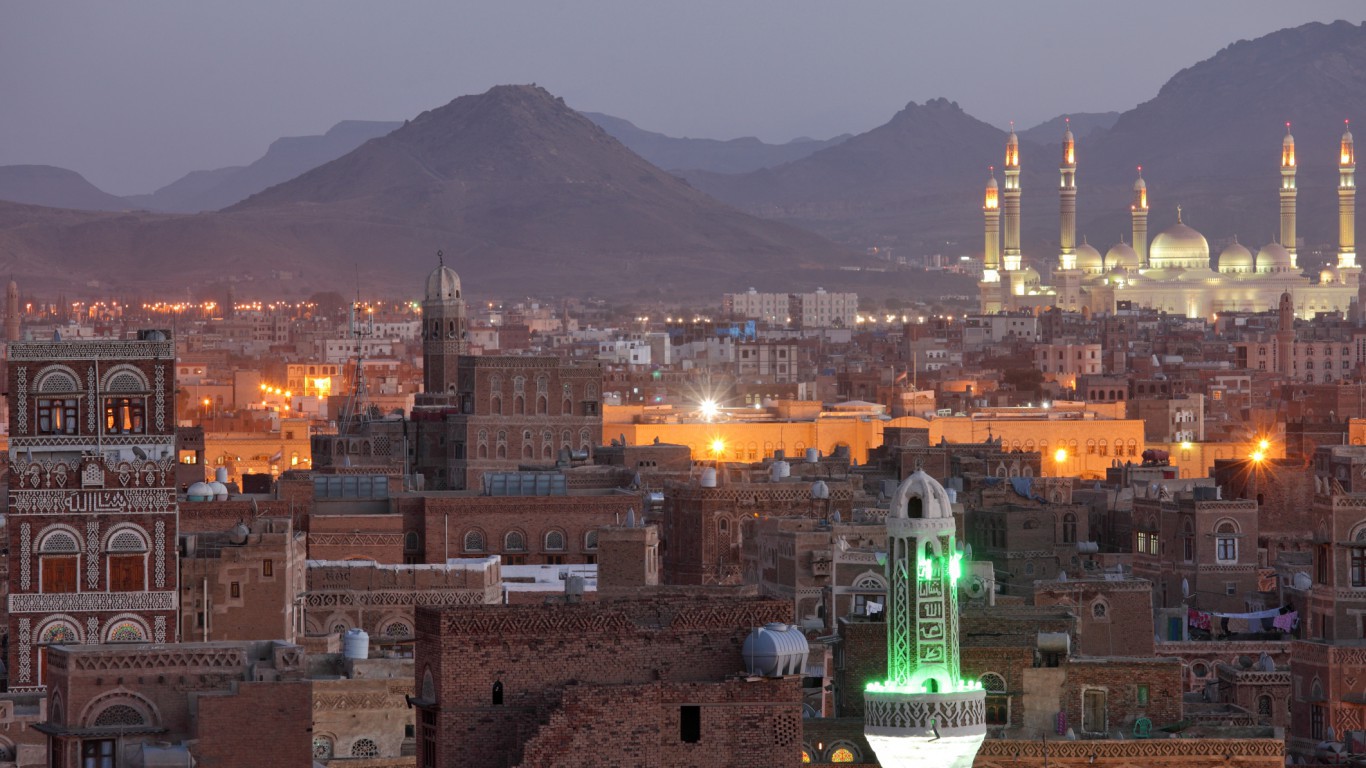
4. Yemen 4th weakest
> Visa-free travel permitted to: 35 countries
> Dual citizenship: Not allowed
> Type of government: In transition
> GDP per capita: $2,477
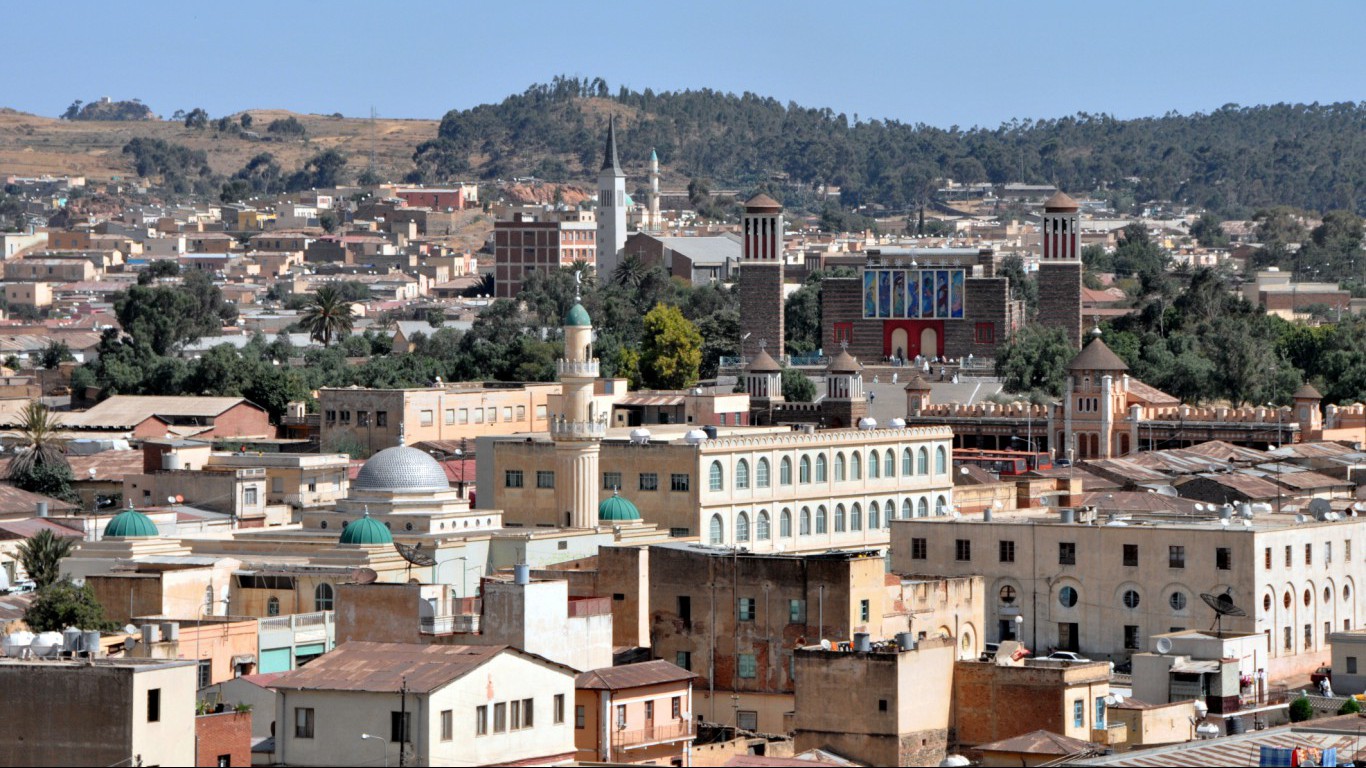
3. Eritrea 3rd weakest
> Visa-free travel permitted to: 37 countries
> Dual citizenship: Not allowed
> Type of government: Presidential republic
> GDP per capita: $1,441
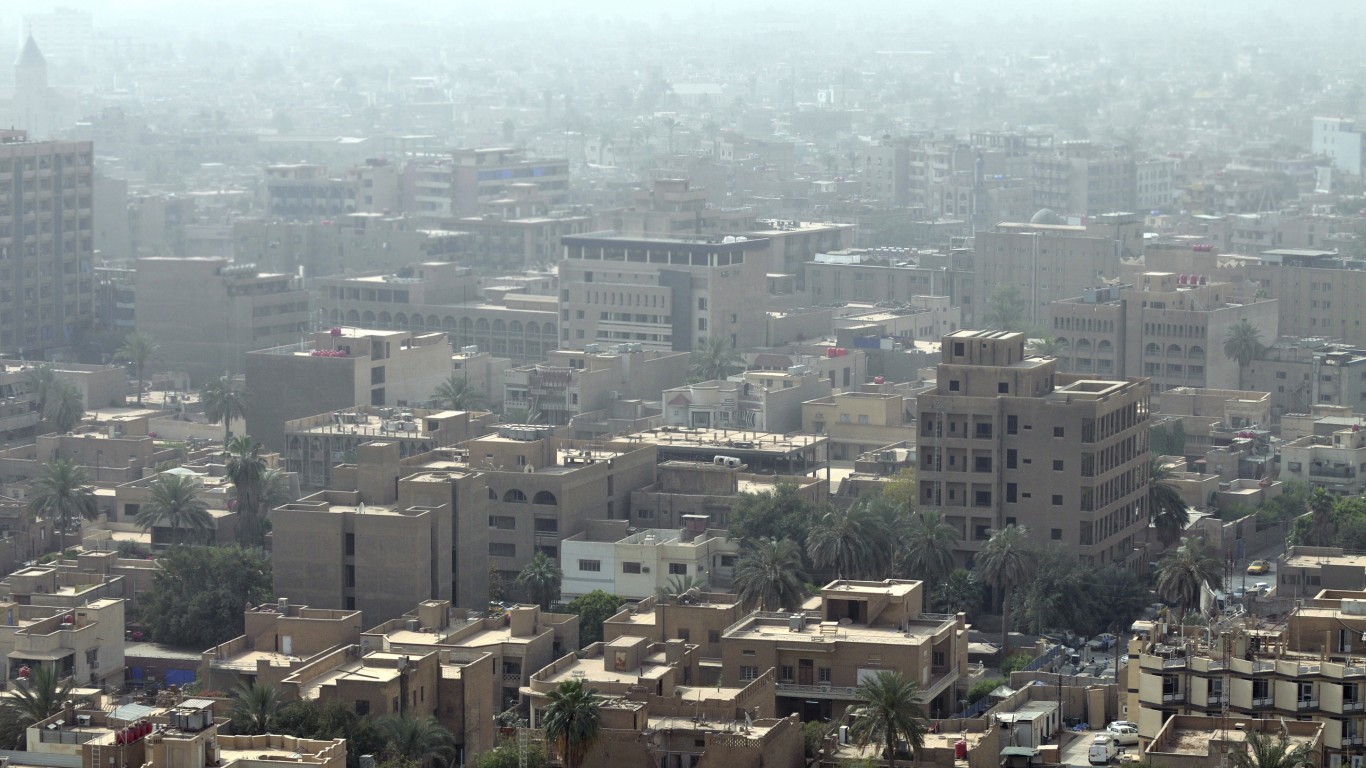
2. Iraq 2nd weakest
> Visa-free travel permitted to: 27 countries
> Dual citizenship: Allowed; some restrictions
> Type of government: Federal parliamentary republic
> GDP per capita: $17,326
[in-text-ad-2]
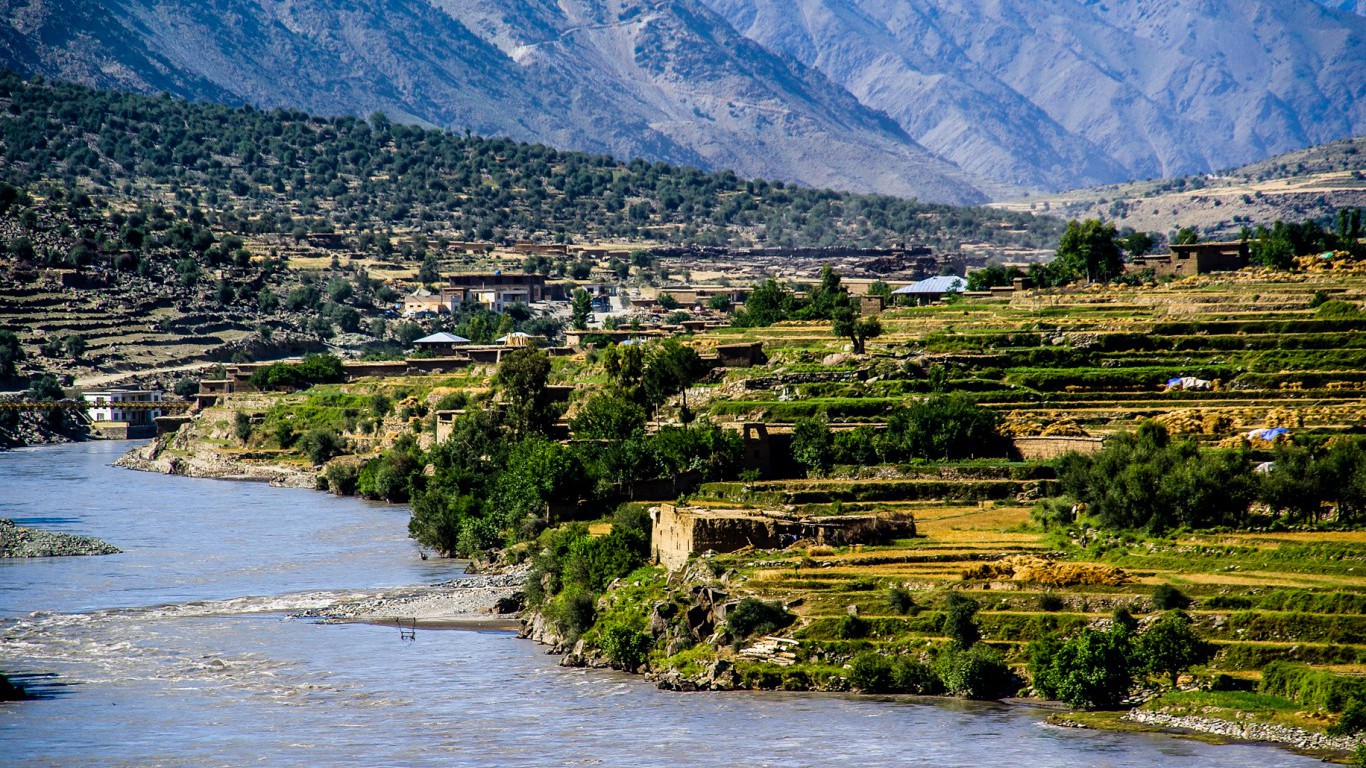
1. Afghanistan 1st weakest
> Visa-free travel permitted to: 24 countries
> Dual citizenship: Not allowed
> Type of government: Presidential Islamic republic
> GDP per capita: $1,833
Detailed findings and methodology:
Citizens from the 25 countries with the weakest passports can only get easy access, or visa-free travel, to a fraction of the countries in the world. Nomad Capitalist defines visa-free travel as a passport that entitles the holder to “visa free access or a straightforward e-visa or visa on arrival” to the country they are visiting.
Citizens of Afghanistan can use their passport to get visa-free access to 24 countries, the fewest of any country considered. By comparison, Singapore and Japan passports grant their holders visa-free access to 180 countries, tied for the most. No nation on this list can get into more that 50 countries visa free.
The strength of a nation’s passport is directly related to how the country is perceived by the rest of the world. Many of the countries on this list struggle with glaring issues that detract from their international reputation for a variety of reasons.
Countries like South Sudan and Yemen are in the midst of violent conflicts that have killed thousands and fully disrupted their economy. Iraq and Afghanistan have been embroiled in conflicts with the United States for years and still suffer from acts of terrorism. Consequently, other countries are much less inclined to welcome Afghan and Iraqi citizens into their borders.
Beyond their international reputations, the countries on this list have other similarities. Almost all are located either in the Middle East or Africa. Those regions have, at least in some parts, struggled to maintain political and economic stability.
Many of citizens of the nations on this list would have a hard time traveling to another country through the proper channels, but violence has forced many to flee their homelands and become refugees. Hundreds of thousands of Rohingya muslims have fled Myanmar in the wake of what the United Nations described as “ethnic cleansing” beginning in 2017.
North Korea is a unique case, as the hermit kingdom opted to largely close itself off from the rest of the world after the Korean War. The authoritarian regime in charge has tight control over who enters and who exits its borders. But even those North Koreans who might be allowed out would not have easy access to many of the world’s countries because of the country’s isolated status.
People from the countries on this list would have a hard time traveling internationally given the weakness of their passports. But for many, that is not an issue they will face as leaving the country can be prohibitively expensive.
Many of these countries are among the world’s poorest. The International Monetary Fund has gross domestic product per capita data on 20 of the 25 countries on this list. Of those, the GDP per capita of 14 is below the world average $10,192. The lowest GDP per capita is of the Democratic Republic of the Congo at $788.55. A low GDP per capita is indicative of poor economic conditions in a country.
In order to determine the countries with the best passports, 24/7 Wall St. reviewed Nomad Capitalist’s 2018 Passport Index. Nomad Capitalist is an organization focused on worldwide asset diversification. The index considers a country’s taxation, international perception, and individual liberties such as free speech, as well as how many countries its citizens can travel to visa-free and whether or not it allows its citizens to hold dual citizenship. Nomad considered 199 countries in its ranking. If countries were tied, the number of visa-free travel countries was used as a tiebreaker.
Annual international departures per capita figures are based on population estimates and the total number of international departures by the citizens of a country from World Bank. The figures are for the year 2016, the most recent available. GDP per capita figures come from the International Monetary Fund. The figures are an estimate based on Purchasing Power Parity from 2017. The country’s type of government comes from the CIA’s World Factbook, except for Palestinian Territory, which was not listed in the World Factbook but describes itself as a parliamentary democracy.
Want retirement to come a few years earlier than you’d planned? Or are you ready to retire now, but want an extra set of eyes on your finances?
Now you can speak with up to 3 financial experts in your area for FREE. By simply clicking here you can begin to match with financial professionals who can help you build your plan to retire early. And the best part? The first conversation with them is free.
Click here to match with up to 3 financial pros who would be excited to help you make financial decisions.
Thank you for reading! Have some feedback for us?
Contact the 24/7 Wall St. editorial team.